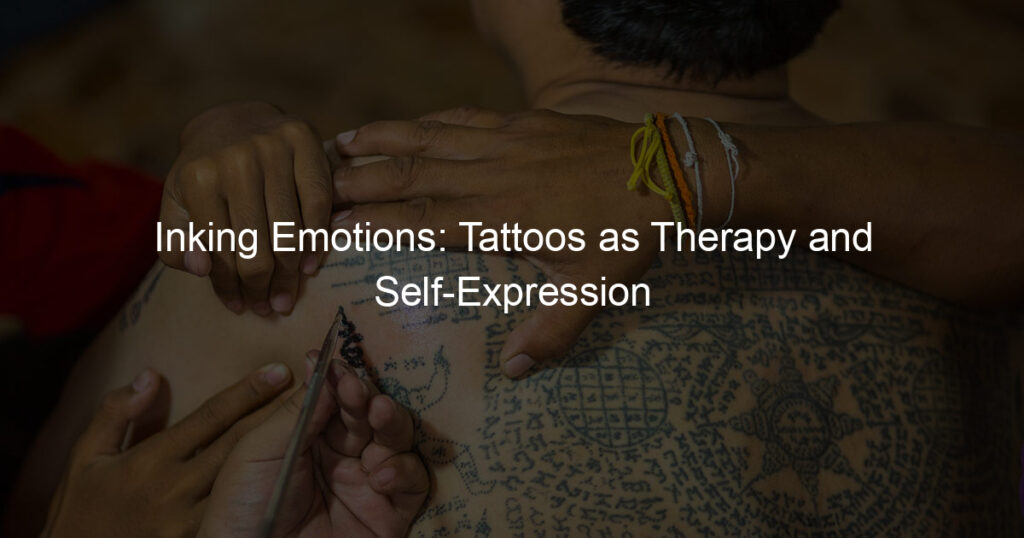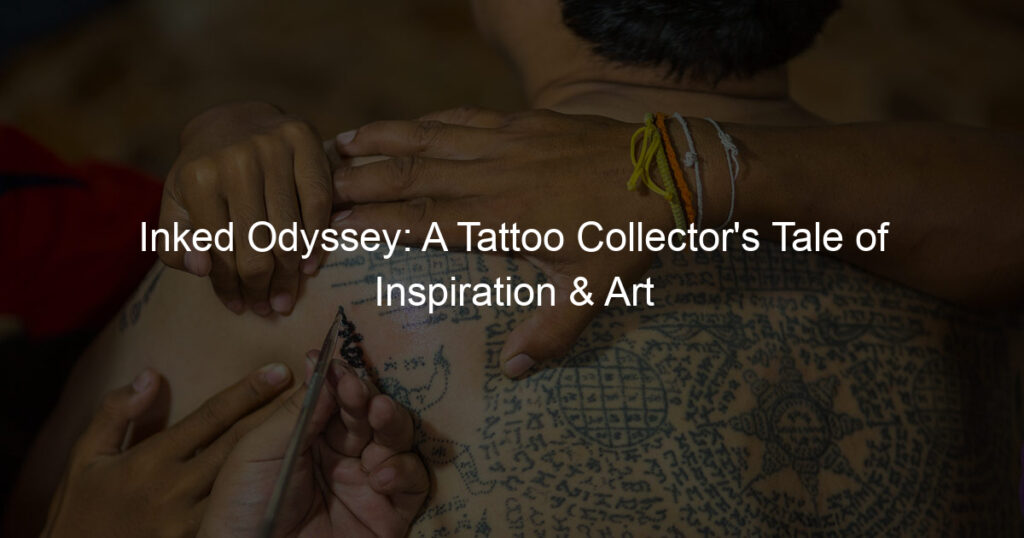
Introduction to Tattoo Therapy
Have you ever heard of Tattoo Therapy? It’s a fascinating topic that combines art, history, and psychology. Let’s dive in and learn more about it.
Tattoo Therapy is a unique form of self-expression that uses tattoos as a way to heal and cope with personal struggles. It’s not just about getting a tattoo; it’s about the journey of healing and self-discovery. The tattoo serves as a constant reminder of the strength and resilience of the individual.
Tattoo Therapy has a rich history that dates back centuries. In many cultures, tattoos were used as a form of healing and protection. For instance, in ancient Egypt, tattoos were believed to have magical properties that could heal illnesses.
Over time, the use of tattoos evolved. In the modern world, Tattoo Therapy has gained recognition as a form of therapeutic self-expression. People use tattoos to tell their stories, commemorate significant events, or symbolize their personal growth.
Now that we’ve covered the basics, let’s explore the different types of therapeutic tattoos and how they can help individuals express themselves and heal emotionally.
| Type of Therapeutic Tattoo | Meaning |
|---|---|
| Mental Health Tattoos | These tattoos often symbolize the individual’s journey with mental health. They can be a symbol of strength, a reminder of survival, or a sign of hope for the future. |
| Emotional Healing Tattoos | These tattoos can represent a significant emotional healing process. They might commemorate overcoming a challenging time, or symbolize a personal transformation. |
Remember, every tattoo has a unique story behind it. It’s a form of art that allows us to wear our stories on our skin. Whether you’re considering getting a therapeutic tattoo or just interested in the topic, understanding the meaning and history behind Tattoo Therapy can give you a deeper appreciation for this form of self-expression.
Understanding Therapeutic Tattoos
Therapeutic tattoos are more than just body art. They are a unique form of self-expression that can aid in emotional healing and mental health improvement. Let’s delve deeper into the different types of therapeutic tattoos.
Types of Therapeutic Tattoos
There are several types of therapeutic tattoos, each with its unique purpose and significance. Here are the three main types:
-
- Mental Health Tattoos
These tattoos often symbolize the wearer’s battle with mental health issues like depression, anxiety, or bipolar disorder. They can be a constant reminder of their strength and resilience. For instance, a semicolon tattoo is a popular choice. It represents the idea that the wearer’s story isn’t over yet, just like a semicolon in a sentence.
-
- Emotional Healing Tattoos
Emotional healing tattoos can help individuals cope with trauma or loss. They serve as a tangible reminder of their healing journey. These tattoos can range from a meaningful quote, a symbol of strength, or even the image of a loved one.
-
- Tattoos for Self-Love
Self-love tattoos are all about celebrating oneself. They can be a symbol of self-acceptance, self-esteem, and self-care. For example, a heart tattoo can symbolize self-love and the importance of taking care of one’s emotional health.
Each type of therapeutic tattoo carries a powerful message of resilience, healing, and self-love. They are not just mere decorations on the skin, but a testament to the wearer’s personal journey and growth.
Benefits of Therapeutic Tattoos
Therapeutic tattoos carry a wealth of benefits that extend beyond skin deep. They play a crucial role in emotional healing, boost self-expression and personal identity, and symbolize personal journey and growth. Let’s delve into these benefits in more detail.
-
- Role in Emotional Healing
Therapeutic tattoos can serve as a powerful tool for emotional healing. They often represent a person’s triumph over adversity, acting as a constant reminder of their resilience. For instance, many cancer survivors get tattoos to commemorate their journey, using the ink as a symbol of their strength and survival. This form of self-expression can provide a sense of closure and aid in the healing process.
-
- Boosting Self-Expression and Personal Identity
Therapeutic tattoos also allow individuals to express their identity and tell their unique stories. The designs chosen often reflect personal experiences, beliefs, or values, making each tattoo a unique piece of art. This form of self-expression can boost self-esteem and confidence, as individuals wear their stories with pride.
-
- Symbolizing Personal Journey and Growth
Lastly, therapeutic tattoos can symbolize personal journey and growth. They can mark significant life events or changes, serving as a reminder of the individual’s evolution over time. For example, a person might get a tattoo after overcoming a difficult period in their life, symbolizing their growth and transformation. This visual representation of personal journey can inspire continued growth and resilience.
In conclusion, therapeutic tattoos offer a unique way to heal, express oneself, and symbolize personal growth. They are more than just ink on skin; they are a form of therapy and self-expression that can have profound psychological benefits.
Self-Expression through Tattoos
One of the most powerful ways people express themselves is through tattoos. Tattoos are more than just ink on skin; they are a form of art that tells a story, represents an idea, or symbolizes a personal journey. Let’s delve into the world of tattoo art and explore its evolution and therapeutic role.
Tattoo as an Art Form
Tattoos have been around for centuries, evolving from simple markings to intricate designs that are now considered a form of art. Tattoo artists are not just individuals who apply ink to the skin; they are artists who use the human body as their canvas.
-
- Evolution of Tattoo Art
The art of tattooing has a rich history that dates back thousands of years. From the simple, symbolic tattoos of ancient cultures to the detailed, colorful designs of today, tattoo art has evolved significantly. In the past, tattoos were often used to symbolize status or tribal affiliation. Today, they are a form of personal expression and artistry. The tools and techniques used in tattooing have also evolved, with modern tattoo artists using electric machines and sterile needles to create detailed and vibrant designs.
-
- Role of Tattoo Artists in Therapy
Tattoo artists often play an unexpected role in therapy. Many people choose to get tattoos as a way to cope with personal trauma or to symbolize their recovery from mental health issues. The process of getting a tattoo can be therapeutic, providing a sense of control and a way to visually express emotions that may be difficult to put into words. Tattoo artists, with their unique blend of empathy, artistry, and skill, can help individuals express their innermost feelings and experiences in a meaningful and tangible way.
In conclusion, tattoos are a powerful form of self-expression and art. They have evolved from simple markings to intricate designs that tell a story, symbolize a journey, or represent an idea. Tattoo artists play a crucial role in this process, using their skills and understanding to help individuals express themselves in a way that is both personal and therapeutic.
Tattoo Symbolism and Meaning
When we talk about tattoos, it’s essential to understand that each design carries a unique symbolism and meaning. These symbols can be personal, cultural, or universal, and they allow individuals to express their identity and emotions in a visual form.
-
- Understanding Tattoo Iconography
Iconography refers to the study of symbols and their meanings. In the world of tattoos, iconography can be incredibly diverse, ranging from simple shapes and colors to complex designs and images. Let’s take a look at some common tattoo symbols and their meanings:
| Symbol | Meaning |
|---|---|
| Rose | Love, beauty, and balance |
| Butterfly | Transformation, freedom, and rebirth |
| Skull | Mortality, danger, and the cycle of life and death |
| Anchor | Stability, strength, and hope |
These are just a few examples of tattoo iconography. The meaning of a tattoo can change based on its design, color, and placement, as well as the personal interpretation of the wearer.
-
- Personal Meanings behind Common Tattoo Symbols
While some tattoo symbols have widely accepted meanings, it’s important to remember that the personal significance of a tattoo can vary greatly from person to person. For example, a rose tattoo might symbolize love and beauty to one person, but to another, it could represent a significant life event or a loved one.
Here are a few examples of how personal meanings can shape the interpretation of common tattoo symbols:
-
-
- A butterfly tattoo could symbolize a person’s journey of transformation and personal growth.
- A skull tattoo might represent a person’s acceptance of their mortality and the fleeting nature of life.
- An anchor tattoo could symbolize a person’s need for stability and grounding in their life.
-
Ultimately, the meaning of a tattoo is deeply personal and unique to the individual who wears it. It’s a form of self-expression that allows people to tell their stories, share their experiences, and express their emotions in a visual and permanent way.
Mental Health Tattoos
When we talk about mental health recovery, one method that is gaining popularity is the use of tattoos. Tattoos, traditionally seen as a form of self-expression, are now being recognized for their potential therapeutic benefits, particularly in the realm of mental health.
The Role of Tattoos in Mental Health Recovery
It might seem surprising, but tattoos can play a significant role in the journey towards mental health recovery. They can serve as a reminder of the struggles overcome, a symbol of strength, or a mark of a new beginning. Let’s delve deeper into this topic by looking at some case studies and understanding the psychological benefits of tattoos.
-
- Case Studies of Tattoos and Mental Health
One of the most compelling ways to understand the impact of tattoos on mental health is through real-life stories. For instance, a woman named Sarah, who battled depression for years, got a tattoo of a semicolon on her wrist. This tattoo served as a symbol of her decision to continue her life story, despite the struggles. Another case is of a man named John who got a phoenix tattoo after overcoming addiction. The phoenix, a symbol of rebirth and renewal, represented his journey from the ashes of his past to a brighter, healthier future.
-
- Psychological Benefits of Tattoos
Aside from the personal meanings and reminders that tattoos can provide, they also offer psychological benefits. One such benefit is the boost in self-esteem. A study conducted by the American Journal of Human Biology found that people with tattoos had significantly higher levels of self-esteem compared to those without. Tattoos can also serve as a form of catharsis, allowing individuals to express their emotions and experiences in a tangible way. Lastly, the process of getting a tattoo can also be therapeutic. The act of enduring pain for a meaningful symbol can be a powerful experience, providing a sense of accomplishment and resilience.
In conclusion, tattoos can play a significant role in mental health recovery. They are not just a form of art or self-expression, but also a tool for healing and self-discovery. As we continue to break down the stigma around mental health, it’s important to recognize and respect the diverse ways individuals choose to navigate their journeys.
Emotional Healing Tattoos
Emotional healing tattoos are a unique form of self-expression that can provide a sense of comfort and closure. They can serve as a constant reminder of personal growth and resilience, helping individuals cope with various emotional challenges.
How Tattoos Facilitate Emotional Healing
Tattoos can play a significant role in the emotional healing process. They can symbolize a journey, represent a memory, or serve as a personal reminder of strength and resilience. Let’s delve into the ways tattoos can facilitate emotional healing.
-
- Role of Tattoos in Grief and Loss
Dealing with grief and loss is a challenging process. Tattoos can serve as a form of therapy, helping individuals express their feelings and commemorate their loved ones. A 2018 survey found that 20% of people get tattoos in memory of someone they’ve lost. These tattoos can provide a sense of connection, keeping the memory of the loved one alive.
-
- Tattoos as a Form of Closure
Tattoos can also provide a sense of closure, especially after traumatic experiences. They can symbolize the end of a difficult chapter and the beginning of a new one. For instance, some people choose to get a tattoo after overcoming a health challenge or ending a toxic relationship. These tattoos serve as a reminder of their strength and resilience, encouraging them to move forward.
In conclusion, emotional healing tattoos can play a crucial role in the healing process. They can help individuals cope with grief and loss, and provide a sense of closure. They serve as a constant reminder of personal growth and resilience, helping individuals navigate through life’s challenges.
Conclusion: Tattoos as a Form of Therapy and Self-Expression
In this article, we have explored the fascinating world of tattoos as a form of therapy and self-expression. We have delved into the various aspects of therapeutic tattoos, understanding their significance and impact on mental and emotional health. Now, let’s summarize our key takeaways and look at the future of tattoo therapy.
- Key Takeaways
Tattoos are not just body art; they can serve as a powerful therapeutic tool. They allow individuals to express their feelings, experiences, and identities in a unique and personal way. Here are the main points we have learned:
- Tattoos can be a form of therapy, helping individuals cope with various mental and emotional challenges.
- Self-expression through tattoos can be a cathartic process, allowing individuals to tell their stories, celebrate their victories, or honor their struggles.
- Mental health tattoos can serve as a reminder of one’s resilience and strength, promoting self-love and acceptance.
- Emotional healing tattoos can help individuals process trauma or grief, providing a tangible symbol of their healing journey.
- Future of Tattoo Therapy
The future of tattoo therapy is promising. As more people recognize the therapeutic benefits of tattoos, we can expect to see a greater acceptance and understanding of this form of self-expression. In the future, we may see more mental health professionals incorporating tattoo therapy into their practice, recognizing its potential to aid in the healing process.
Moreover, the stigma associated with tattoos is gradually fading, opening up more opportunities for individuals to use tattoos as a form of therapy and self-expression. The future holds exciting possibilities for the intersection of art, therapy, and personal expression.
In conclusion, tattoos are more than just ink on skin. They are a powerful form of self-expression and therapy, offering individuals a unique way to navigate their mental and emotional health. As we move forward, let’s continue to explore and embrace the therapeutic potential of tattoos.














